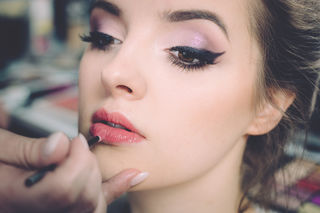Sex
What Does Makeup Say About You?
Does the amount of makeup you wear communicate your attitudes toward casual sex?
Posted January 3, 2018 Reviewed by Ekua Hagan
Key points
- Many research studies have shown that women wearing makeup are judged to be more attractive by both male and females.
- Women who wear makeup are commonly judged to have a greater interest in men and to be more promiscuous.
- Research shows that cosmetics do not communicate anything of importance about a women’s sexual motives or desires.

Why do women wear makeup? Human behavior is complex and there are likely a number of reasons, but it is probably uncontroversial to suggest that by far the most important is to increase attractiveness.
Many research studies have shown that women wearing makeup are judged more attractive by both male and female raters. This is probably because makeup exaggerates the femininity of the face (the natural color of the lips and eyes is darker compared to the surrounding skin in women than it is in men) or because makeup makes a face look younger (an even skin color is associated with youth).
Perceptions of women who wear makeup
Makeup has other effects on how a woman is perceived beyond beauty. Women who wear makeup are judged to have a greater interest in men, to be more promiscuous, and to have a less restricted sociosexuality (which is just jargon for an interest in and approval of short-term uncommitted sexual relationships).
Now, it’s important to point out that it shouldn’t matter if these perceptions are accurate. There’s nothing wrong with sleeping around, or thinking one-night-stands are fine and dandy. But it’s equally important to note that scientists have found that men are prone to what we call the “sexual over-perception bias”: the propensity to interpret neutral behavior as indicative of sexual interest. If men perceive a woman is interested in sex and they are correct, then everything is A-OK. It’s when men assume a woman is interested when she isn’t that problems ensue.
Research on women and makeup
Carlota Batres of Gettysburg College in Pennsylvania had around 70 young women report to her lab. All of the women regularly wore makeup, spending an average of $11 each month on cosmetics, which took around 12 minutes each day to apply and remove. The women were photographed twice: once wearing their normal daily makeup, and once with no makeup at all. Next, a group of male and female volunteers rated these women for their attractiveness and for how comfortable they might be with enjoying casual sex.
Women were rated more attractive and more comfortable with casual sex when they wore makeup than when they didn’t. This was true whether the ratings were provided by men or women.
But are these perceptions accurate? Batres asked the women who had been photographed to complete a questionnaire about their own attitudes to casual sex. Women with a less “restricted sexuality” did not spend more money or time on makeup. The women’s photographs were rated for how much makeup the women appeared to be wearing: unrestricted women did not appear to have applied more makeup. And the women’s ratings of their own sociosexuality did not tally with the ratings of the male and female judges: There was no relationship between self-ratings and ratings by other women; men’s estimates were even worse, with more restricted women being judged less restricted.
Further analysis revealed that men’s perceptions were based purely on the positive effects of makeup on attractiveness: more attractive women were seen as more comfortable with casual sex, even though women’s self-reports suggest this was untrue.
The researchers say that:
“Our results … reveal that makeup use is not an accurate cue for sociosexuality."
So, makeup does make a woman more attractive, but there is no evidence that cosmetics communicate anything of importance about a women’s sexual motives or desires.
It’s worth pointing out, however, that this study only investigated women who regularly wear makeup; it is possible that there are differences in psychology and behavior between women who regularly wear makeup and women who never wear makeup. It also remains to be seen whether different styles of makeup say anything about the wearer, whether accurate or not.
References
Batres, C., Russell, R., Simpson, J. A., Campbell, L., Hansen, A. M., & Cronk, L. (2018). Evidence that makeup is a false signal of sociosexuality. Personality and Individual Differences, 122, 148–154.


